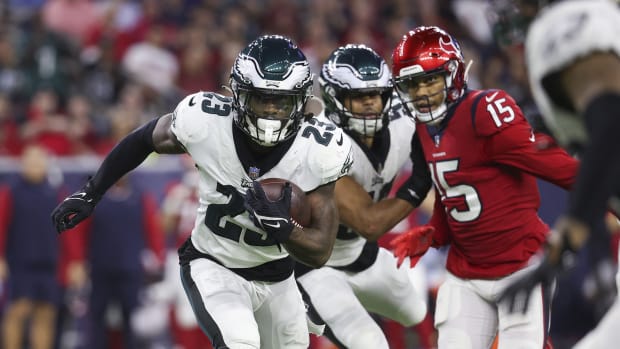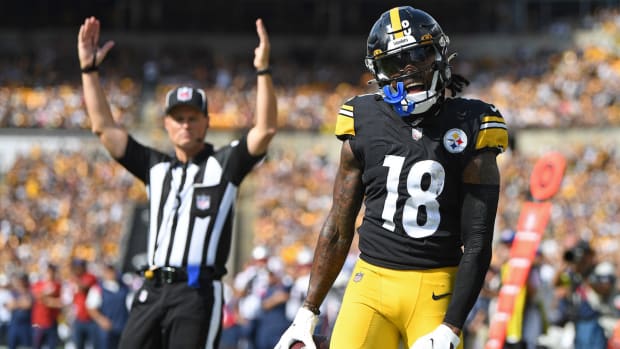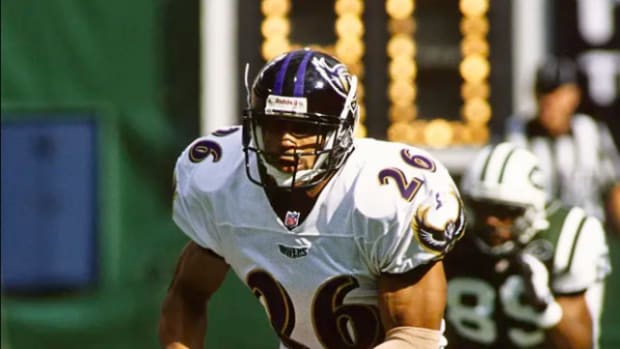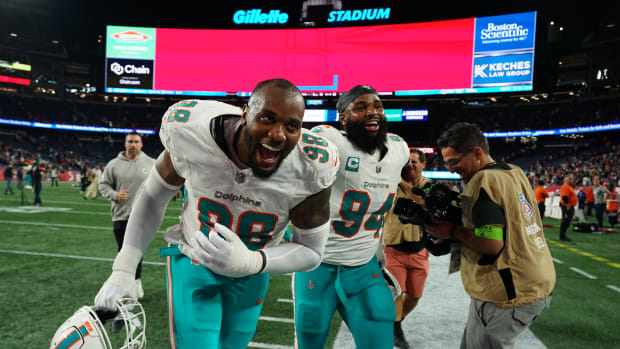Calvin Ridley’s Suspension Is More Proof the NFL Always Punishes Players More than Owners
In suspending Falcons wide receiver Calvin Ridley for a season, the NFL on Monday did what it always does: thumped its chest with the equivalent of a low-hanging-fruit arrest to pretend it is tough on gambling, while allowing the league’s owners to operate in the gray area with complete impunity.
Ridley did not play in the team’s final 11 games last season, after announcing he was stepping away to focus on his mental health. He then gambled on games while he was away from the Falcons on the nonfootball injury list, according to The MMQB’s Albert Breer and other media reports. Ridley said himself on Twitter that he wagered a sum of $1,500. The investigation did not find any inside information being used on any bets, nor did it find any other coaches or players were involved. The league often burns sensitive documents by the barrel, though its official statement made sure to include the verbose, personal finger-wagging commissioner Roger Goodell provided to Ridley in his suspension letter. How nice of everyone.
The news was released to the masses amid a stream of facepalm emojis, with the most distant from reality among us pretending this is a modern version of Pete Rose or Shoeless Joe Jackson—the kind of scandal that could shake the integrity of the game. Of course, the rest of us laughed. The NFL has made sure that betting is available at the tip of our fingers at every living second. The league is formulating the next generation of brain-warped addicts peeing their spare change away. The NFL is cashing in on the influx of a Wild West sportsbook market and fortifying its bulletproof yachts with it. And the league is upset that one of its players, while on leave, decided to flick through an app on his phone and have a good time on an island the league itself helped create?
This is especially hilarious considering the backdrop in front of which everything stands. An active NFL coach has accused an owner of offering him $100,000 per loss, and yet the league seems to have donned all its tactical gear and busted down Ridley’s doorstep. This is just like the way in which the league handled COVID-19, how the NFL breathlessly released a report of catching a few dunderheaded rule violators on security cameras while allowing one of the league’s most popular players to publicly deceive the world of his own vaccination status and another player to waltz through the facility with a phony vaccination card.
A Cowboys executive is alleged to have spied on and taken cellphone pictures of dressing cheerleaders. Jon Gruden is suing the NFL. What’s happening with the women who named Daniel Snyder in sexual harassment allegations?
This is one of many sad days for the NFL, and not because some kind of ethical yellow line has been crossed. It’s because the league continues to be driven into the moral ground while punishing its players for far more minor versions of infractions its owners commit, seemingly on a daily basis. It’s like a reality show, with little, tiny pieces the league can control, using players’ real-life decisions and shortcomings to shield against the actual issues, the ones that will really matter when it comes to game integrity. I’ve been in locker rooms and interviewed players—and coaches—with less credible fantasy or gambling insight than some of the experts we see on TV immersed in trends or advanced betting theory. Ridley had access to the players inside the locker room? So does every single person with a Twitter handle who could direct message their favorite athlete and prod them for the same kind of advice in exchange for a cut of the winnings. So does every family member of every player, who can bet under a phony account and reap the same advantages.
Ridley is just a pawn in the NFL’s somehow irony-free search for integrity on gambling. If the NFL wanted to impress someone today, it would have announced some kind of task force to find out how deep and problematic the environment with legal gambling it’s created has become. Of course, that would involve admitting some kind of fault. That would involve looking at themselves in the mirror, which league executives have avoided at all costs.
The NFL Network first reported (how convenient!) that one of the games Ridley bet on was a Falcons game. The league’s media arm also noted that, when the charges came to Ridley’s doorstep, he admitted what he did.
This is likely because the NFL made gambling feel so benign, so casual. The NFL is creating the snowglobe that Ridley exists inside and yelling at him for all the tiny white droplets hitting the ground. It suspended him for longer than domestic abusers the league wanted to see back on the field to improve its fantasy football product. Longer than people who committed federal crimes with serious, real-world implications.
Even if Ridley won a fistfull of Floyd Mayweather money (which he didn’t), he shouldn’t serve a quarter of his suspension until the NFL cleans up its own duplicitous act on gambling and begins to seriously investigate the power players who are shaping the way that games are won and lost behind the scenes.
Otherwise, this is a pathetic version of the same old story, not unlike what the coaches and general managers do every summer: make an example out of one expendable person for violating some senseless rule while holding open the gate for the more important folks to keep on keeping on without the slightest fear of a slap on the wrist.
More NFL Coverage:
• MMQB: How Aidan Hutchinson Became a Top Draft Prospect
• The Short, Sweet Era of Mercenary Star QBs May Already Be Over
• 2022 NFL Draft Prospect Rankings: Top 100 Big Board 1.0





































